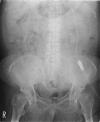Successful peritoneal dialysis for the end-stage kidney disease associated with Prader-Willi syndrome: a case report
- PMID: 30963414
- PMCID: PMC6620230
- DOI: 10.1007/s13730-019-00395-3
Successful peritoneal dialysis for the end-stage kidney disease associated with Prader-Willi syndrome: a case report
Abstract
Prader-Willi Syndrome (PWS) is characterized by hyperphagia, severe obesity, and mental retardation from early childhood and occurs 1/10,000 to 1/15,000 live births in Japan. There is high prevalence of diabetes mellitus because of hyperphagia. The patient may sometimes face the necessity of renal replacement therapy (RRT) because of end-stage kidney disease (ESKD) caused by diabetes-associated kidney disease (DKD). Since mental retardation and extreme obesity usually prevent to introduce peritoneal dialysis (PD), hemodialysis (HD) has been the first choice of RRT. In this report, we experienced one case of patient with PWS suffering from ESKD due to DKD who started PD as an initial RRT and succeeded to continue for total of 40 months. The patient was 37-year-old man at the time of initiation of dialysis. PD was chosen for RRT because we suspected that he might have more technical difficulties for continuing HD. After several episodes of peritonitis, he successfully continues PD without peritonitis for next 27 months until the present time with good support by his family member. To our best knowledge, this is the first reported case of ESKD associated with PWS who was successfully treated with PD for long period.
Keywords: Diabetes mellitus; End-stage kidney disease (ESKD); Hybrid dialysis; Obesity; Peritoneal dialysis (PD); Prader–Willi syndrome (PWS).
Conflict of interest statement
The authors declare no relevant financial interests.
Figures



Similar articles
-
Peritoneal dialysis is the therapy of choice for end-stage renal disease patients with hereditary clotting disorders.Adv Perit Dial. 2000;16:170-3. Adv Perit Dial. 2000. PMID: 11045286
-
Infants Requiring Maintenance Dialysis: Outcomes of Hemodialysis and Peritoneal Dialysis.Am J Kidney Dis. 2017 May;69(5):617-625. doi: 10.1053/j.ajkd.2016.09.024. Epub 2016 Dec 10. Am J Kidney Dis. 2017. PMID: 27955924
-
Risk Predictors and Causes of Technique Failure Within the First Year of Peritoneal Dialysis: An Australia and New Zealand Dialysis and Transplant Registry (ANZDATA) Study.Am J Kidney Dis. 2018 Aug;72(2):188-197. doi: 10.1053/j.ajkd.2017.10.019. Epub 2017 Dec 23. Am J Kidney Dis. 2018. PMID: 29277508
-
Mechanisms of obesity in Prader-Willi syndrome.Pediatr Obes. 2018 Jan;13(1):3-13. doi: 10.1111/ijpo.12177. Epub 2016 Nov 10. Pediatr Obes. 2018. PMID: 27863129 Review.
-
What is the value of growth hormone therapy in Prader Willi syndrome?Arch Dis Child. 2014 Feb;99(2):166-70. doi: 10.1136/archdischild-2013-303760. Epub 2013 Oct 25. Arch Dis Child. 2014. PMID: 24162007 Review.
Cited by
-
Kidney disease in adults with Prader-Willi syndrome: international cohort study and systematic literature review.Front Endocrinol (Lausanne). 2023 Jul 21;14:1168648. doi: 10.3389/fendo.2023.1168648. eCollection 2023. Front Endocrinol (Lausanne). 2023. PMID: 37547314 Free PMC article.
-
Mission P(D)ossible: peritoneal dialysis in difficult cases.Clin Kidney J. 2025 Jan 6;18(2):sfae403. doi: 10.1093/ckj/sfae403. eCollection 2025 Feb. Clin Kidney J. 2025. PMID: 39968508 Free PMC article.
References
Publication types
MeSH terms
LinkOut - more resources
Full Text Sources
Medical

